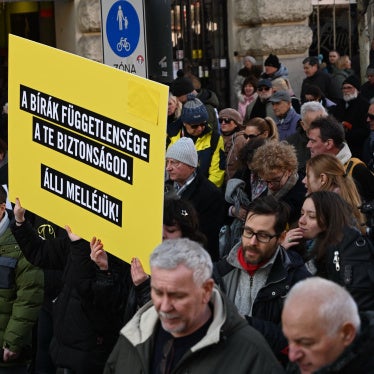World leaders should not ignore human rights violations in Chechnya at the upcoming summit with Russia, Human Rights Watch said today.
The E.U.-Russia summit starts today in St. Petersburg, against the backdrop of the city’s 300th anniversary festival. Russian President Vladimir Putin will also welcome leaders from more than forty-five countries to his native city, hosting a lavish program of events to mark the anniversary. President Putin will meet with U.S. President George W. Bush on June 1.
“EU and U.S. leaders should look beyond the festivities to Russia’s appalling human rights record in Chechnya,” said Elizabeth Andersen, executive director of Human Rights Watch's Europe and Central Asia division. “The number of murders and forced disappearances committed in Chechnya makes the republic one of the most dangerous places on earth. St. Petersburg’s splendor should not eclipse this.”
Human Rights Watch said that, despite Russia’s assurances of normalization in Chechnya, the situation on the ground has not improved. With the Chechen war in its fourth year, civilians continue daily to be victims of killings, forced disappearances and torture.
According to recently released official statistics, 1,132 civilians were killed in Chechnya in 2002, making the murder rate there more than five times higher than in St. Petersburg and one hundred times higher than in EU countries. Since the beginning of the conflict, hundreds have disappeared without a trace after being detained by Russian troops. Official statistics indicate that at least two people “disappear” in Chechnya every day, and showed no decrease in the number of disappearances for the first three months of 2003.
Human Rights Watch research in March documented twenty-six disappearances between late December and late February. This was the highest rate of “disappearances” Human Rights Watch has documented since the beginning of the conflict. Officials have also recently admitted the existence of forty-nine mass graves containing remains of almost 3,000 people on the territory of Chechnya.
According to the Russian procuracy, since the beginning of the operation, only fifty-eight cases against federal servicemen have reached the trial stage, of those only twelve were on murder charges. Not a single case of forced disappearance case has reached the courts.
“To date, Russian authorities have shown no commitment whatsoever to investigating and prosecuting abuses,” said Andersen. “Summit attendees should strongly back the need for justice.”
The Russian leadership has blatantly disregarded any recommendations made by the international community to improve human rights compliance in Chechnya. Russia has refused to issue invitations to key United Nations mechanisms, including the U.N. Special Rapporteur on Torture and the U.N. Working Group on Disappearances, as required by two prior resolutions adopted by the U.N. Commission on Human Rights. Russian authorities have further failed to make available detailed information about the accountability process, as required by the Council of Europe.
Human Rights Watch strongly urged EU and U.S. leaders to use the summit to seek commitments from President Putin regarding Russia’s compliance with key U.N. and Council of Europe requirements and regarding protection and security guarantees for Chechen civilians.
“If Russia wants to be a respected international partner, it should demonstrate a commitment to internationally recognized human rights norms,” said Andersen. “If world leaders fail to raise the human rights situation in Chechnya, that certainly sends a message too.”







